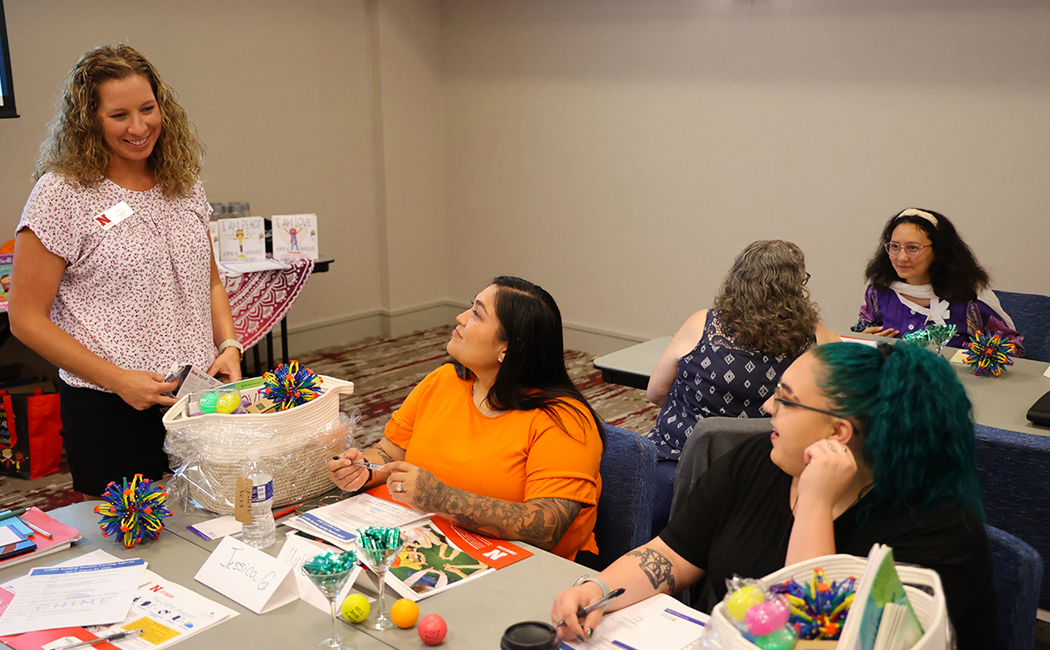
For many Nebraska families, finding affordable child care can seem like piecing together an impossible puzzle.
Parents juggle waitlists, long commutes and tough choices between work and staying home — all while early childhood teachers themselves face low pay, long hours and stress.
To address this challenge, Nebraska Extension, Communities for Kids, the University of Nebraska at Kearney and the University of Nebraska–Lincoln have partnered to launch the Knowledge Network for Early Childhood Education Workforce (KNEW), a workforce development program focused on recruiting and retaining early childhood educators across the state — particularly in rural communities, where the shortage is most severe.

Funded by a $2 million grant from the U.S. Department of Education, the project is led by Philip Lai, associate professor of communication disorders at UNK and a CYFS research affiliate.
“The KNEW project is truly a cross-campus collaboration,” Lai said. “This work is vital in addressing a troubling decline in both the availability and quality of early childhood care and education across rural Nebraska.”
In recent years, Lai said, growing vacancies in child care professionals have posed serious challenges. Without access to enriching early learning environments, he said, children’s development may be hindered.
According to a 2023 report from Voices for Children in Nebraska, 84 of the state’s 93 counties do not have enough spots in licensed child care facilities to meet demand. Nine of those counties were classified as “child care deserts.”
Additionally, research from Nebraska Extension and We Care for Kids shows that almost one-third of parents with children ages 5 and younger left the workforce because they were unable to find affordable child care, and 74% of Nebraskans believe a lack of quality, affordable child care is a serious statewide problem.
“At the same time, parents lacking dependable child care often face difficulties in maintaining steady employment — an issue that reverberates through local businesses and impacts the broader state economy,” Lai said.
KNEW is built on the idea that solving this crisis requires more than just adding child care seats; it also requires supporting the educators themselves. By connecting teachers, businesses and nonprofits in 15 rural communities, the program creates local networks for skill building, professional support and identifying effective and sustainable ways to provide quality child care.
One ardent supporter of KNEW is Nebraska Sen. Deb Fischer, who sponsored the federal appropriation. She called the program “an investment in Nebraska’s next generation.”

The UNL portion of the project is led by Holly Hatton, associate professor of child, youth and family studies. She is working with Nebraska’s Extension’s Early Childhood team to design, implement and evaluate personalized professional learning experiences. These include training in emotional resilience, conflict resolution and reflective practice.
“Our work is about more than training; it is about providing community-based learning and supports that uplift educators’ existing knowledge while helping them grow new skills,” Hatton said. “Through professional learning experiences that focus on resilience, reflection and connection, we can strengthen both educators and children’s early learning environments.”
Nebraska Extension is offering 16 hours of paid training for educators through a mix of online learning and reflective consultation.
“Our goal is to support and create compassionate caregivers for Nebraska’s children — helping them respond to conflict in healthy ways and better understand themselves and how they interact with others,” said Jaci Foged, Early Childhood Extension coordinator. “We think this training offers valuable tools for educators to use in their daily work.”
Hatton said KNEW is unique because of its community-driven and collective impact approach.
“When professional learning is rooted in compassion and supported by community, it creates lasting change,” she said. “By helping educators care for themselves and each other, we’re building sustainable solutions to Nebraska’s child care challenges and fostering compassionate care that benefits children, families and communities.”
Learn more about this project in the CYFS Research Network.